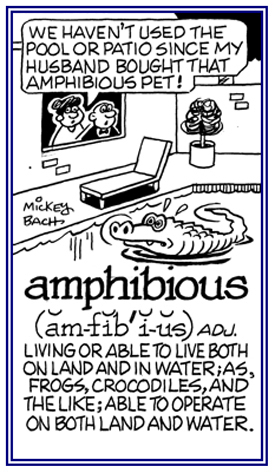ampho-, amph-, amphi-
(Greek: around, about, both, on both sides of, both kinds)
amphanthium
A dilated receptacle found in some inflorescences.
amphiarthrodial (adjective), more amphiarthrodial, most amphiarthrodial
Pertaining to connecting disks which allow slight motions, as that between the vertebrae: Jane's naturally upright posture was reinforced by the amphiarthrodial condition of her spine which allowed only a slight bending movement.
The skeleton in the anatomy class allowed the students to study the natural amphiarthrodial condition of the spinal column.
1. A type of articulation between boney surfaces that are connected by ligaments or elastic cartilage which permit limited motion between the vertebrae: After her automobile accident, Pamela found her amphiarthrosis was impaired and she required extensive physiotherapy in order to restore some comfortable movements in her back.
2. A form of jointing consisting of two bones being united by a cartilage of some elasticity, which prevents one surface sliding onto the other, but permits a certain amount of movement; such as, in the contacts of the vertebral column, the carpus (eight bones forming the wrist), etc.: Hester benefited from the physiotherapy exercises she did every morning as she noticed the amphiarthrosis in her back was feeling more flexible and therefore more comfortable.
2. A form of jointing consisting of two bones being united by a cartilage of some elasticity, which prevents one surface sliding onto the other, but permits a certain amount of movement; such as, in the contacts of the vertebral column, the carpus (eight bones forming the wrist), etc.: Hester benefited from the physiotherapy exercises she did every morning as she noticed the amphiarthrosis in her back was feeling more flexible and therefore more comfortable.
amphiaster, amphiastral
1. A spindle-shaped formation in a developing ovum, with radiations at each end, thus resembling two star-shaped figures conjoined.
2. The achromatic figure, formed in mitotic cell-division, consisting of two asters connected by a spindle-shaped bundle of rodlike fibers diverging from each aster, and called the spindle.
2. The achromatic figure, formed in mitotic cell-division, consisting of two asters connected by a spindle-shaped bundle of rodlike fibers diverging from each aster, and called the spindle.
amphiatlantic (adjective) (not comparable)
Referring to something occurring on both sides of the Atlantic Ocean: Some amphiatlantic plant species are found along the coasts of eastern North America and western Europe, for example the pipewort and the Scots lovage.
Amphibia
1. A being that lives either in water or on land, or is equally at home in either element.
2. A class of quadruped vertebrates containing frogs, newts, salamanders, toads, caecilians, and many fossil groups.
2. A class of quadruped vertebrates containing frogs, newts, salamanders, toads, caecilians, and many fossil groups.
They have skin glandular without epidermal scales, feathers, or hairs with a tail present primitively but lost in some groups. They have limbs or girdles reduced or absent in some forms. Eggs are anamniotic, primitively laid in water with external fertilization. Tadpole larvae posses gills and open gill slits. Ovoviviparity and viviparity are exhibited by some species and these vertebrates contain a single extant subclass called Lissamphibia.
amphibian
A cold-blooded vertebrate that spends some time on land but must breed and develop into an adult in water. Frogs, salamanders, and toads are amphibians.


The fossil remains of animals that had lived in the past both on land and in water.
amphibiological (adjective) (not comparable)
Relating to a part of zoology that consists of animals which are adapted to living on land and in water; such as, seals and sea turtles.
amphibiology (s) (noun)
A scientific study about the Amphibia; that part of zoology that refers to animals that function as they exist on both land and in water.
A class of quadruped vertebrates containing frogs, newts, salamanders, toads, and many fossil groups.
The condition of an organism that spends part of its life on land and part in water.
amphibiotic (adjective), more amphibiotic, most amphibiotic
Animals that are living in water during an early phase of development and on land during the adult period.
amphibious (adjective), more amphibious, most amphibious
1. Descriptive of a creature that is adapted to live on land as well as in water: Some animals, including frogs and toads, are amphibious in that they can survive both in streams and in dry areas.
2. Referring to something that can operate both on soil and in very wet areas: Jack’s parents had an amphibious vehicle which could be driven on the highway or even across a river without using a bridge!Hudibras

© ALL rights are reserved.
Go to this Word A Day Revisited Index
2. Referring to something that can operate both on soil and in very wet areas: Jack’s parents had an amphibious vehicle which could be driven on the highway or even across a river without using a bridge!
Amphibious. That which partakes of two natures, so as to live in two elements; as, in air and water.
A creature of amphibious nature,
On land a beast, a fish in water.

Go to this Word A Day Revisited Index
so you can see more of Mickey Bach's cartoons.
amphibiously (adverb), more amphibiously, most amphibiously
Relating to a vertebrate animal of the class Amphibia in which the young generally undergo transformation from larva with gills to an adult air-breathing form with lungs; many of which live on soil and breed in liquids; such as streams, lakes, ponds, or oceans.

